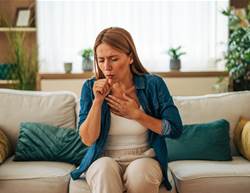Summertime issues like heat rashes and sunburn have been on everyone’s radar forever. But with the acceleration of climate change, the 10 warmest years ever recorded have all occurred since 2010 and experts predict that over the next decades the planet’s average temps could soar another 2 to 10 degrees. So, it’s time to consider the serious health dangers caused by extreme heat, says sports medicine expert Dr Elizabeth Gardner.
On some level, we all know heat is dangerous, especially those who live in the hotter parts of Australia. But these days heat can impact you anywhere, with climate experts warning we're about to experience the hottest summer on record in 2023-24.
And while bushfires are more dramatic than high temperatures, more people in Australia actually die from extreme heat than from any other weather-related events, according to the Australian Institute of Health and Welfare.
Heat also makes thousands of people each year extremely sick. It's not just heat stroke, either. Extreme heat can also worsen existing health conditions such as diabetes, kidney disease and heart disease.
Australian researchers determined that each time the thermometer goes up one degree Celsius, reports of illnesses leap by 18%.
Some of heat's effects don’t happen immediately and so fly under the radar: hospital visits for kidney stones, urinary tract infections and other kidney conditions spike several days after the heat rolls in, one recent study found. And when the thermometer soars, more people with mental-health conditions suffer too, with a greater number heading to the ER for worsening anxiety and schizophrenia, scientists discovered last year.
It’s easy to overestimate your ability to tolerate heat, Dr Gardner says, but during a heat wave, thermostat readings after the sun goes down may matter more than those at the height of the day, particularly if you don’t have air conditioning. Your organs need a chance to cool down at night, which keeps them healthy, says Kurt Shickman, director of the extreme heat initiative of the Adrienne Arsht-Rockefeller Foundation Resilience Center in the US, . “Most of the negative health outcomes happen when you have high nighttime temperatures,” he notes.

Another reason it can be hard to know whether hot is too hot: There is more involved than thermometer readings. Scientists use a “wet bulb” gauge, similar to the “feels like” measurement on common weather apps, that takes into account wind speed, cloud cover, and, importantly, humidity, the latter of which is especially problematic when you exercise outdoors.
Exercise and heat exhaustion
“The process of burning energy generates heat that must be dissipated with sweating,” Dr Gardner says. When the air is thick with moisture, the sweat cannot evaporate, so you don’t cool down.
That’s what happened to Hallie Levine while she was running a marathon on a hot, humid day several years ago. Levine, a 49-year-old health writer from America, had previously run several marathons, but this time when she reached halfway she didn’t just feel tired. She was nauseous, dizzy, and had cold, clammy skin, which Hallie recognised as classic symptoms of heat exhaustion.
“I could push myself and keep going, but I’d probably end up in the hospital,” she recalls thinking. So she slowed down and drank a lot of water, before mostly walking to the finish line. That was smart, says sports medicine physician Dr Kristopher Paultre, who treats athletes for heat illness. However, he says it would have been even safer would to see the medical team who was covering the event.
Long-term impacts
Extreme heat is especially dangerous to our brains. “The highest level of illness is called heat stroke for a reason,” Dr Paultre says, because symptoms like confusion and dizziness are similar to an actual stroke. Worse could be neurological symptoms that persist, or death.
Several summers ago when Veronica Smith (not her real name), 52, was working as a long-distance truck driver, the temperature in her cab was often over 37 degrees, even with her small portable AC on full blast. And it wasn’t much cooler as she slept in her cab many nights.
Smith started to experience heat exhaustion, but with cargo to deliver she had to keep driving. Ever since, Smith has had brain fog, which she attributes to her long, hot drives. “I lose my train of thought or become overwhelmed, even in casual conversations,” she laments.
So how can we stay safe? Pay the same attention to prepping for heat as you would to getting ready for a bushfire or flood.
Here’s how to stay safe in the sizzle
Know the signs: Heat exhaustion is a milder heat-related illness that can lead to heatstroke if not treated. If you have heat exhaustion, you will usually be sweating a lot, and have pale, cool, damp skin, says Health Direct. If you have heat exhaustion, move to a cooler place, sip water and cool your body with ice packs or a cool shower.
If heat exhaustion turns into heat stroke, symptoms may include intense thirst, slurred speech, problems coordinating movements, agressive behaviour, confusion, fainting and seizures.
If your symptoms get worse or you think you have heat stroke, call emergency services on 000.
Hydrate slowly: You can’t guzzle a bottle of water just before heading out in summer, because the body can absorb only a small amount at a time, Dr Gardner says. Safely pre-hydrate by steadily sipping water over several hours.
Sip as you go: “On a hot day, you need to carry water even if you usually don’t,” she says, and drink every 20 minutes. If you plan to exercise outside for more than an hour, use an electrolyte solution instead of plain water.
Dress cool: Wear loose-fitting, thin materials to aid sweating, and light colours to keep your skin cool.
Remember your personal risks: People with cardiovascular and respiratory illnesses are especially vulnerable to excessive heat, as are children and the elderly. Economically disadvantaged people seem to suffer more, too.
Hunker down: Stay in air conditioning during a multiday heatwave.
Be a good neighbour: Check on others who don’t have air conditioning or who are otherwise at risk, Shickman says. Get them cool water, and if you see they’re suffering from heat stress, alert emergency services. If they’re struggling but don’t need professional help, take them to a library, the movies, or someplace else that’s cool.
Worried a heat wave might be on the way? The Bureau of Meteorology's Heatwave Service provides a forecast for the next few days.










